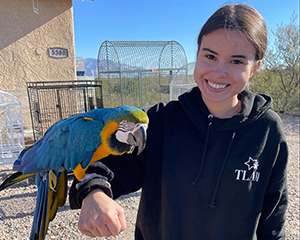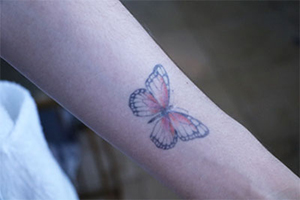Former DDD Member Breaks Barriers and Exceeds Expectations for Those on the Spectrum
For many teens, the middle and high school years can be full of challenges and setbacks, both academically and socially. Lillian, who goes by “Lilly,” remembers being bullied and teased in high school because she was on the autism spectrum. Today, this bright 20-year-old is setting her own goals and meeting each challenge with confidence. Her success proves that individuals on the spectrum can learn to build loving relationships and social connections while making vocational strides.
Connecting with Animals and Building a Career

Lillian and friend at the animal clinic.
Lilly’s mother, Nicolle, is proud of the outstanding achievements she now has under her belt. Graduating from high school with a 4.1 GPA, Lilly was offered a choice of scholarships. She chose the one that allows her to work on her dream career of helping animals. “I’ve known my whole life that I’ve always wanted to be a vet because growing up on the spectrum, I had a hard time understanding how to talk to people,” said Lilly. “I feel like I can connect with animals … they can’t necessarily communicate with people verbally, kind of like how I was at one point.”
A double-S.T.E.M. (Science, Technology, Engineering, Math) major at the University of Arizona, Lilly also is working on a minor in writing. Among her current classes at U of A’s pre-veterinary medical school are organic chemistry, calculus, economics, and fictional writing.
Lilly has a particular passion for dogs, hummingbirds, and butterflies. “I’ve always loved butterflies,” said Lilly. “I’ve always had a special connection with them because of my great-grandma. She said that she wanted to get a butterfly tattoo before she passed, but that never happened. So, I actually got one for her.”

Looking forward to winter break from college, Lilly plans to return to a part-time job at a spay-and-neuter clinic to build up her clinical hours. Over the summer, she learned how to give animals vaccines, anesthesia, and prepare them for surgery or dental work. “It was so exciting!”
Connecting with Peers and Building a New Social Life
According to Nicolle, children on the spectrum “learn how to be more dedicated to themselves. They work harder. They’re more driven, more motivated, more dedicated … than neuro-typical children. They may have [what appears to be] a social deficit … it’s really not. It’s just a different journey, a different life, a different path.”
It’s been “quite a journey,” said Lilly. “Someone who is on the spectrum doesn’t really understand how to socialize with other people, as much as someone else who isn’t on the spectrum. That applies to many things such as behavioral cues or understanding when there’s an appropriate place and time to say certain things. Just understanding the social nature of people can be a challenging thing, even for people not on the spectrum. So just imagine how much harder it is for people like me.”
Compared to high school, “College is a whole different ball game,” said Lilly. “College is not as clique-y as high school is. Everybody’s just living their own life.”
Since enrolling in U of A, Lilly has joined a sorority. “Being in big groups of people was never my thing growing up… I actually got into the top sorority that I wanted … The girls are actually very friendly and authentic. It honestly has given me the social life I never had growing up. It definitely gives me the opportunity to be more involved outside of school.”
How Love and Support Lead to Success
Lilly’s parents divorced when she was two years old so she was raised by her mother, Nicolle, and grandmother, Jacque. “After the divorce, I had to go back to work,” said Nicolle. “My mom [Jacque] quit her job.” Jacque then joined Hope Group, a DDD-contracted provider, and became Lilly’s respite and habilitation provider. The three women are very close.
Nicolle offered this advice to parents whose child has received an autism diagnosis: “People who may have a child that’s diagnosed on the spectrum, always feel that it’s a deficit. But what these kids really actually get is a leg-up on a typical peer because they are placed in front of people - therapists, doctors, teachers - to thrive.” Lilly, for example, received speech therapy, habilitation and respite services from DDD.
Overall, Lilly doesn’t consider her autism to be a disability. To her, it’s just a neurological disorder. “I’m a very open person and it’s an honor for me to share my story with other people… I’m at the point in my life where I’m not going to hide from it because it’s not something that I let define who I am.”

